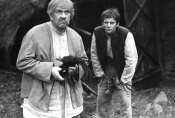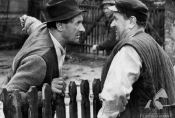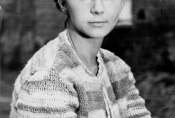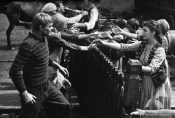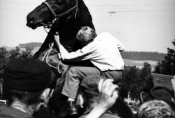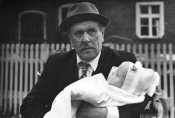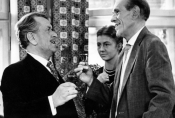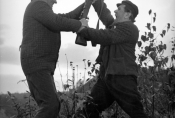OUR FOLKS [1967]
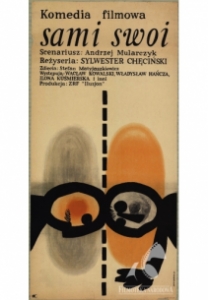
year:
- 1967
release date:
- 15 IX 1967
runtime:
- 78 min
directed by:
- Sylwester Chęciński
written by:
- Andrzej Mularczyk
director of photography:
- Stefan Matyjaszkiewicz
cast:
- Wacław Kowalski [Kazimierz Pawlak; Kacper Pawlak in the flashback sequence], Władysław Hańcza [Władysław Kargul; Kargul Senior in the flashback sequence], Zdzisław Karczewski [Jaśko „John” Pawlak], Eliasz Oparek-Kuziemski [Kokeszko, a miller], Ilona Kuśmierska [Jadźka Pawlakowa], Jerzy Janeczek [Witia Pawlak], Maria Zbyszewska [Mania Pawlak], Aleksander Fogiel [a village leader], Kazimierz Talarczyk [Antoni Wieczorek], Witold Pyrkosz [Warszawiak], Halina Buyno [Aniela Kargulowa], Natalia Szymańska [Leonia Pawlak], Zygmunt Bielawski [Paweł Pawlak], Borys Borkowski, Adam Dzieszyński, Zdzisław Kuźniar [a soldier observing the taming of a horse], Jan Łopuszniak [German priest]
edited by:
- Janina Niedźwiecka
music by:
- Wojciech Kilar
production design:
- Jan Grandys
produced by:
- Studio Filmowe „Iluzjon”
executive producer:
- Stanisław Adler
awards:
-
• Award of the Minister of Culture and Arts of the 2nd degree 1969 for Sylwester Chęciński
• Lubusz Film Summer Łagów 1976: Grand Prix Golden Grape for Sylwester Chęciński
• Golden Camera 1978 for Sylwester Chęciński
About the film
One of the best and most popular Polish comedies steeped in the tradition of Fredro’s Zemsta. Exquisitely written, realistic and grotesque characters are set against a contemporary background.
In the first years after the war, during the great migration to the Western Lands, two families come from the Borderlands − the Karguls and the Pawlaks. Somewhere behind the River Bug, on their tiny farms, they have been fighting with each other ever since Kargul’s cow entered Pawlak’s field and ploughed a three-finger wide strip of his neighbour’s land. Two barns were burned, blood was shed, and Jasiek Pawlak, in order to avoid prison, had to emigrate to America. Many years later when he comes to visit his brother Kazimierz, to his surprise he finds him on the best of terms with the hated Władysław Kargul, while their children are happily married. To appease his brother, Kazimierz begins the story from the beginning − that is from the moment they settled in the Western Lands. In these areas, land was plentiful, everyone could sow as they wished; the feud still continued for a long time, sustained by the temperament of the adversaries, though undermined by the secret love between their children − Jadźka and Witia. Kargul and Pawlak argue about the only cat in the neighbourhood purchased for a quintal of wheat, about a horse that is more difficult to obtain than a tank or cannon, and about the vet, who must first be plied with moonshine. But the pioneering living conditions demand their resourcefulness, so in times of need they set their pettiness aside, replacing it with solidarity and a Christian imperative to help one’s neighbour.
Jan Słodowski, Leksykon polskich filmów fabularnych, Warszawa 1996
